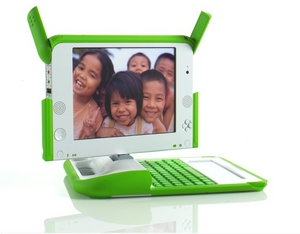The OLPC Wiki/lang-ja
| 翻訳された The OLPC Wiki | 原文 |
| english | عربي | پښتو | български | deutsch | español | français | kreyòl ayisyen | italiano | 日本語 | 한국어 | монгол | Bahasa Melayu | नेपाली | norsk | português | română | русский | kinyarwanda | türkçe | 中文 | 繁體中文 +/- | 変更 |
- This is an on-going translation
OLPC Wikiへようこそ。これはOne Laptop per Childに関連するプロジェクトとコミュニティの共同作業の記録です。現在、9,909のページがあり、千人以上の登録者がいます。ぜひ、参加してアイデアを共有しましょう。
Welcome to the OLPC Wiki, home to collaborative notes about the One Laptop per Child project and related projects and communities. We currently have 9,909 pages and over one-thousand registered contributors; please join us and share your ideas.
新着情報
- B3マシンが金曜日にケンブリッジのOLPCオフィスに届きました。これは最終形に近いです。Geode LXプロセッサ、改善されたキーボードとタッチパッド、多くの電気的, 機械的改良、そして明るい色のXOロゴが背面に付きました。第一印象は「おぉ!」です。
- 最新リリース: 新しい安定ビルド、Build 406と合わせて新しいファームウェア、Q2C11が公開されました。ぜひマシンを更新してください。これは、自動再インストールイメージを使って簡単にできます。事実上、全システムの機能におよぶ多くの改良があります(リリースノート)。
- 最初のB3直前のマシンが組み立てられて現在動作しています。
- 現地語化: 現在、www.laptop.orgのスペイン語訳が使えます。Xavier Alvarezのたゆまぬ努力に感謝します。その他の言語についてのテンプレートがLocalization/www.laptop.orgに追加されています。また、簡体中国語訳 も利用できます。Scott Zhu、ありがとう。同様にポルトガル語訳(Paulo Drummondに感謝)、 韓国語訳(Do Young-Min, 도 영민に感謝)も使えます。
- B2マシンが開発者プログラムに参加した開発者に配られています。実機がなくてもエミュレータを使って、今使っているコンピュータで実行することもできます。もし実機を持っているなら、BTest-2 リリースノートとB1とB2のデモノートを読んでください。B1のリリースノートはまだここにあります。
週毎のアップデートは「現在のイベント」にあります。
- B3 machines arrived at the OLPC offices in Cambridge on Friday. These machines, which are close to final, feature the Geode LX processor, improved keyboard and touch pad, many electrical and mechanical enhancements, and a brightly colored XO logo on the back. First impression: Wow!!
- Latest release: The new stable build, Build 406, along with a new firmware release, Q2C11, are now available. Please update your machines: the autoreinstallation image makes this easy; you'll find many improvements in virtually all system functions (Release notes).
- The first pre-B3 machines have been built and are now operational.
- Localization: The Spanish translation of www.laptop.org is now on line, thanks to the tireless efforts of Xavier Alvarez. The templates for adding additional languages can be found at Localization/www.laptop.org. The Simplified Chinese translation is also on line, thanks to Scott Zhu; as is the Portuguese translation, thanks to Paulo Drummond; and the Korean translation, thanks to Do Young-Min, 도 영민.
- B2 machines are being distributed to developers who have joined the Developers Program. Those without machines can still run emulators on their current computers. If you have a machine, please see the BTest-2 Release Notes and B1 and B2 Demo Notes. B1 Release Notes can still be found here.
Weekly updates can be found in Current events.
One Laptop per Child(OLPC)について
- 「これは教育のプロジェクトだ。ラップトップのプロジェクトではない。」
ここはOne Laptop per Child(一人の子供に一台のラップトップ; OLPC)のWikiです。この非営利団体の目的は、低価格のノートパソコン— $100 ラップトップ—と世界の子供たちを教育する方法についての革命的な技術を開発することです。私たちのゴールは世界中の子供たちに探求や経験、自己表現の機会を提供することです。
Why do children in developing nations need laptops? Laptops are both a window and a tool: a window into the world and a tool with which to think. They are a wonderful way for all children to learn learning through independent interaction and exploration.
OLPC espouses five core principles: (1) child ownership; (2) low ages; (3) saturation; (4) connection; and (5) free and open source.
More on the Laptop and OLPC's vision for learning.
- It's an education project, not a laptop project.
This is the wiki for the One Laptop per Child association. The mission of this non-profit association is to develop a low-cost laptop—the "$100 Laptop"—a technology that could revolutionize how we educate the world's children. Our goal is to provide children around the world with new opportunities to explore, experiment, and express themselves.
Why do children in developing nations need laptops? Laptops are both a window and a tool: a window into the world and a tool with which to think. They are a wonderful way for all children to learn learning through independent interaction and exploration.
OLPC espouses five core principles: (1) child ownership; (2) low ages; (3) saturation; (4) connection; and (5) free and open source.
More on the Laptop and OLPC's vision for learning.
What you'll find inside
A good place to start exploring this wiki is the One Laptop per Child page, which gives an overview of the project. There is a list of frequently asked questions (FAQ); a place to ask a question; and numerous pages on hardware, software, content, and the developers program—and a separate wiki for software development. Sugar is a novel interface with its own interface guidelines. There are also discussion pages on issues of deployment and country-specific discussions. An extended table of contents is also available. The latest build is always available here. The latest stable build is always available here.
このWikiについて
このWikiの目的はプロジェクトについての情報を共有し、アイディアとフィードバックを生み出すことです。
The purpose of this wiki is to both share information about the project and to solicit ideas and feedback. The articles and discussion vary from technical to epistemological. We invite comments on every page (please use the "discussion" tab at the top of each page). Please restrict edits to the article pages themselves to facts, not opinions. You are encouraged to sign your work and to make liberal use of citations and links. (Please make an account and please use ~~~~ as a signature for your comments.) Please note that pages that include the {{OLPC}} template—such as this one—are maintained by the OLPC team and are generally representative of the current state of the project. Other pages—created and maintained by the public—should be read with that in mind.
